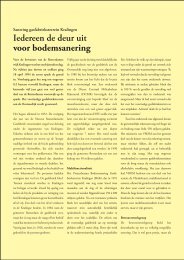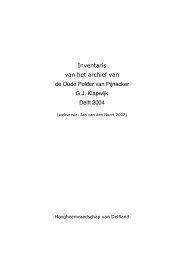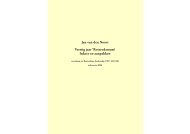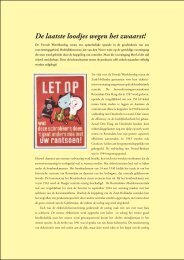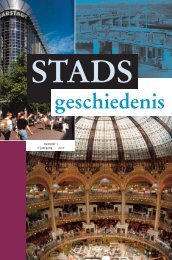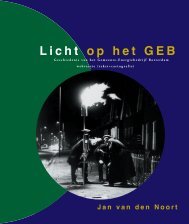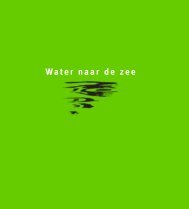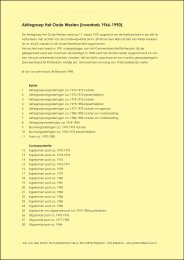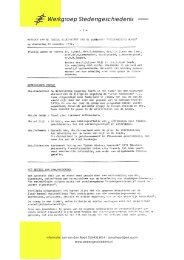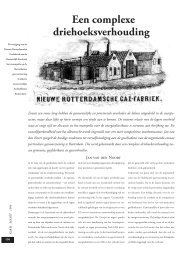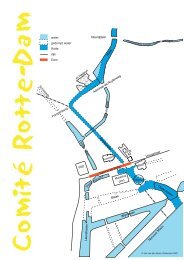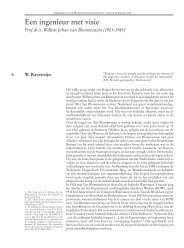Net Werk voor de Geschiedenis van Hygiene en Milieu, 1999-2001 ...
Net Werk voor de Geschiedenis van Hygiene en Milieu, 1999-2001 ...
Net Werk voor de Geschiedenis van Hygiene en Milieu, 1999-2001 ...
Create successful ePaper yourself
Turn your PDF publications into a flip-book with our unique Google optimized e-Paper software.
19<br />
20<br />
graphical writings of Alexan<strong>de</strong>r<br />
von Humboldt’<br />
12.15-13.30 Lunch break<br />
13.30-14.15 Hubert <strong>van</strong> <strong>de</strong>n Berg<br />
(University of Groning<strong>en</strong>), ‘The<br />
repres<strong>en</strong>tation of nature as conv<strong>en</strong>tion.<br />
On the role of g<strong>en</strong>re<br />
<strong>de</strong>nominations’<br />
14.15-15.00 Sv<strong>en</strong>d Erik Lars<strong>en</strong><br />
(University of Aarhus), ‘Virtues<br />
and virtualities’<br />
15.00-15.30 Tea break<br />
Natura naturata v. natura naturans<br />
15.30-16.15 Frans Vera (Ministry<br />
of Agriculture, Nature Managem<strong>en</strong>t<br />
and Fisheries, The Hague)<br />
‘Doomed to reconstruct. Because<br />
we’ve ma<strong>de</strong> nature disappear as<br />
fact, we have con<strong>de</strong>mned ourselves<br />
to fiction’<br />
16.15-17.00 Rob Leopold (in<strong>de</strong>p<strong>en</strong><strong>de</strong>nt<br />
philosopher, Niebert),<br />
‘Nature betwe<strong>en</strong> distance and<br />
participation’<br />
Friday 5 November, Offerhauszaal<br />
Nature and nation<br />
9.30-10.15 H<strong>en</strong>k <strong>van</strong> Zon (University<br />
of Groning<strong>en</strong>), ‘Illusion<br />
and reality. Picturesque or realistic<br />
portrayal of Dutch landscapes by<br />
some ninete<strong>en</strong>th-c<strong>en</strong>tury painters’<br />
10.15-10.45 Coffee break<br />
10.45-11.30 Friedmar Apel (University<br />
of Pa<strong>de</strong>rborn), ‘Sacral<br />
nature and nationalism in the<br />
Wan<strong>de</strong>rvogel movem<strong>en</strong>t and in<br />
the circle of Stefan George’<br />
11.30-13.30 Lunch break<br />
13.30-14.15 Nina Witoszek (University<br />
of Oslo), ‘Mo<strong>de</strong>rnity and<br />
nature mythologies: the case of<br />
Germany and Scandinavia’<br />
14.15-15.00 Wil Verhoev<strong>en</strong> (University<br />
of Groning<strong>en</strong>), ‘Ecology as<br />
requiem: nature, nationhood, and<br />
history in Francis Parkman’s “history<br />
of the American forest”’<br />
15.00-15.30 Tea break<br />
Nature and sustainability<br />
15.30-16.15 Andrew Dobson<br />
(Keele University), ‘Nature: just a<br />
social construction’<br />
16.15-17.00 Maart<strong>en</strong> Hajer (University<br />
of Amsterdam), ‘A frame<br />
in the fields. Analysing culture<br />
and i<strong>de</strong>ntity in <strong>en</strong>vironm<strong>en</strong>tal<br />
politics’<br />
17.00 Closure of the symposium;<br />
reception.<br />
Registration<br />
Further information and registration<br />
(before Monday 25 October<br />
<strong>1999</strong>) at the following address:<br />
Marijke Wubbolts, Rudolf Agricola<br />
Instituut, Rijksuniversiteit<br />
Groning<strong>en</strong>, Postbus 716, 9700 AS<br />
Groning<strong>en</strong><br />
e-mail: m.r.b.wubbolts@let.rug.nl ;<br />
tel: +31-50-363 7336<br />
The <strong>en</strong>trance fee for the <strong>en</strong>tire symposium<br />
is Dfl 120,- Entrance for one<br />
day only will cost Dfl 65,- Stu<strong>de</strong>nts<br />
and Ph.D.-stu<strong>de</strong>nts (aio’s / oio’s) pay<br />
no fee. Lunch, coffee and tea are inclu<strong>de</strong>d<br />
in the <strong>en</strong>trance fee, which is to<br />
be paid cash at the symposium.<br />
65<br />
contactblad <strong>van</strong> <strong>de</strong><br />
stichting net werk <strong>voor</strong> <strong>de</strong><br />
982-983<br />
geschie<strong>de</strong>nis <strong>van</strong> hygiëne <strong>en</strong> milieu<br />
redactie: myriam d a r u<br />
webversie: jan <strong>van</strong> <strong>de</strong>n n o o r t<br />
20<br />
21<br />
Location<br />
Aca<strong>de</strong>miegebouw, Broerstraat 5,<br />
Groning<strong>en</strong>. Dates of the AIO<br />
course: 14 October, 28 October<br />
and 11 November, 14 -17 pm<br />
Organization<br />
Hubert <strong>van</strong> <strong>de</strong>n Berg,<br />
Faculty of Arts<br />
(tel +31-50-363 5197)<br />
Marcel Wiss<strong>en</strong>burg,<br />
Faculty of Philosophy<br />
(tel +31-24-361 1853)<br />
Marijke Wubbolts,<br />
secretary / coordinator Agricola<br />
Eva-Anne le Coultre,<br />
stu<strong>de</strong>nt assistant Faculty of Philosophy<br />
in collaboration with the<br />
research group “Repres<strong>en</strong>tation of<br />
nature” of the Rudolf Agricola research<br />
school.<br />
Disastro! Disasters<br />
in Italy Since 1860<br />
A two-day International Confer<strong>en</strong>ce<br />
to be held at Yale University,<br />
organized by the Association for<br />
the Study of Mo<strong>de</strong>rn Italy, the Departm<strong>en</strong>t<br />
of History, Yale and the<br />
Departm<strong>en</strong>t of Italian, Yale and<br />
Mo<strong>de</strong>rn Italy. The Journal of the<br />
Asssociation for the Study of Mo<strong>de</strong>rn<br />
Italy.<br />
Friday 18th and Saturday 19th June<br />
<strong>1999</strong>, Yale University, New Hav<strong>en</strong>,<br />
USA<br />
There is no European society whose<br />
mo<strong>de</strong>rn history has be<strong>en</strong> more<br />
<strong>de</strong>eply marked by disasters, both<br />
natural and social, than has Italy’s.<br />
The rec<strong>en</strong>t earthquakes have highlighted<br />
once again the geographical<br />
frailty of the p<strong>en</strong>insula. Italy is a<br />
land with active volcanoes, seismic<br />
zones from North to South<br />
(only Sardinia has be<strong>en</strong> free of<br />
earthquakes) 1,000 miles of vulnerable<br />
coastline, river basins which<br />
flood frequ<strong>en</strong>tly, forests which burn<br />
every Summer, land which is vulnerable<br />
to slips and snowfalls. Disease,<br />
both epi<strong>de</strong>mic and <strong>en</strong><strong>de</strong>mic, from<br />
cholera and malaria to AIDS, has<br />
haunted Italy insist<strong>en</strong>tly. Italy has<br />
not be<strong>en</strong> free of man-ma<strong>de</strong> disasters,<br />
such as the Vajont dam flood<br />
of 1963 (where over 2,000 people<br />
were killed) or the Seveso chemical<br />
leaks of 1976. Terrorism created<br />
its own traumatic disasters, such<br />
as at Piazza Fontana and Bologna<br />
Station. Military <strong>de</strong>feats - Custoza<br />
and Lissa, Dogali and Adowa, Caporetto<br />
and the Second World War<br />
-have s<strong>en</strong>t profound shocks through<br />
Italian society. The 1990s saw<br />
landslips ingulf whole towns near<br />
Naples, whilst thousands of prospective<br />
immigrants risked <strong>de</strong>ath on<br />
a daily basis attempting to reach<br />
Italy in flimsy craft.<br />
The response to many of these tragic<br />
ev<strong>en</strong>ts can tell us much about<br />
Italy. Disasters test the social fabric<br />
and the political system to their li-<br />
19/20<br />
<strong>Net</strong> <strong>Werk</strong> 65 - oktober <strong>1999</strong><br />
20/21



